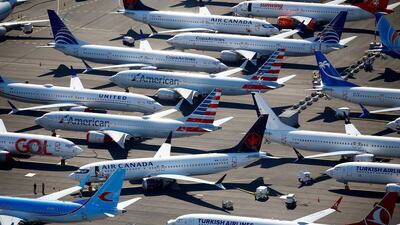US regulators have told Boeing that pilots may require additional training to properly respond to emergencies on the 737 Max after airline crews failed to perform proper procedures in simulator tests.
In a February 19 letter to Boeing, the Federal Aviation Administration (FAA) detailed multiple missteps that airline crews had made in the December simulator sessions and said additional tests are needed.
The test scenarios replicated failures similar to those in two fatal crashes. An analysis of the results by FAA and regulators in other nations reviewing revisions to the grounded jetliner may prompt “additional training requirements pertaining to the aircraft",the letter said.
As a result of the tests, Boeing had already reversed its long-held position that Max pilots who were certified to fly on earlier versions of the 737 did not need extra simulator training. But the letter provides more detail about issues raised in the sessions and is the first indication the government is also examining the need for more training requirements.
It is the latest complication for Boeing's efforts to bring the 737 Max, its best-selling jet, back into service almost a year after it was grounded worldwide after the crashes. Decisions on training are important because they could delay the plane's return and be costly for airlines.
"We have submitted an initial recommendation regarding simulator training on the 737 Max, but we will continue to work with airline customers and global regulators to assess and finalise the content of the training," Boeing said. "Ultimately, it will be the regulators who determine the training requirements."
Pilots from the three US airlines that fly the Max, American Airlines, United Airlines and Southwest Airlines, along with a crew from Grupo Aeromexico were tested in December simulations of multiple emergency scenarios.
The tests were conducted in a simulator running Boeing's updated flight-control system that was developed in the wake of the crashes. While none of the crews committed such egregious mistakes that they lost their planes, the errors were extensive, according to the FAA.
The pilots, who had received additional training proposed by the company, failed to finish emergency checklists related to the automated system involved in both 737 Max crashes, known as Maneuvering Characteristics Augmentation System. In addition, they had difficulty with emergency procedures related to sensor failures, erroneous altitude and airspeed readings and the autopilot, among others, according to the letter. The tests also showed that some pilots were confused about how the autopilot behaved in some circumstances and their interactions with the plane's automated warning systems were distracting.
The FAA said it had asked members of the Joint Operations Evaluation Board –made up of pilot-training experts from the agency as well as Europe, Canada, and Brazil – to perform similar reviews.
The tests are part of federal requirements that airliner systems must be relatively intuitive and average pilots can perform the procedures necessary to respond to failures and emergencies.
The effort is part of a multi-step process of evaluating training requirements for the plane. The FAA is taking the lead, but regulators such as the European Aviation Safety Agency are working with the agency and performing their own assessments.
"The agency is following a thorough, deliberate process to verify that all proposed modifications to the Boeing 737 Max meet the highest certification standards," the agency said.
The FAA is working with aviation regulators in other nations and will take as much time as it required, the agency said. The crashes of two 737 Max jets – in October 2018 near the coast of Indonesia and in March 2019 in Ethiopia – killed 346 people, led to the prolonged grounding and prompted massive upheaval at Boeing.
Boeing is already in the process of expanding training following its January 7 announcement that it backed mandatory simulator sessions for pilots transitioning from the popular 737
The plane maker originally had sold the Max as an updated version of its 737 and so similar to earlier models that pilots only needed a short training course on an iPad. However, the pilots in the simulator sessions in December had been given a revised training course and still made multiple missteps, showing that more was needed. Boeing's January decision makes it almost certain that regulators in the US, Europe and elsewhere will mandate simulator training, though they haven't yet made a decision.

